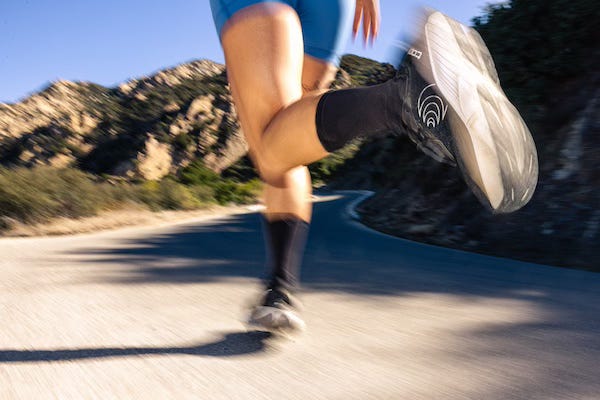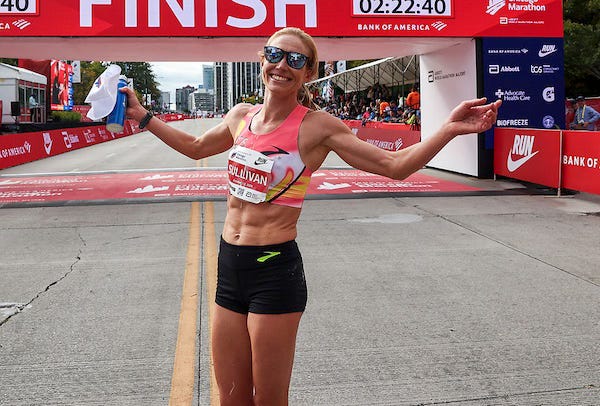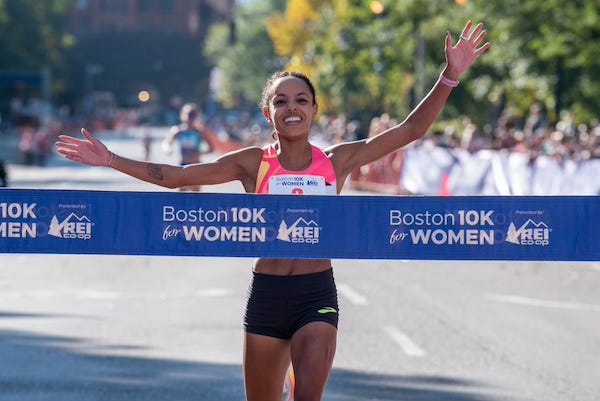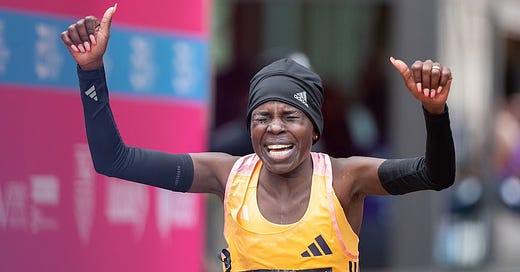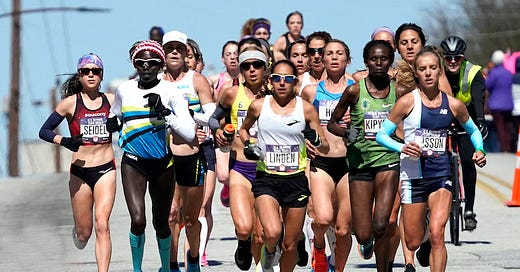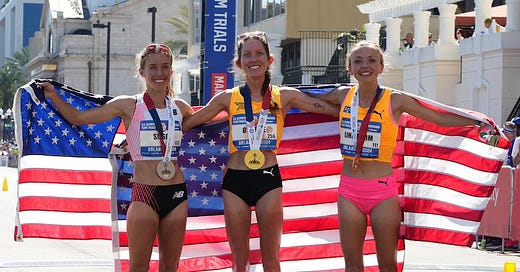

Discover more from Fast Women
Issue 319, sponsored by Topo Athletic
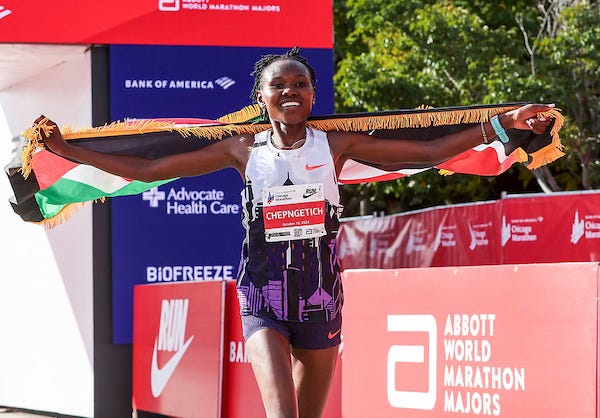
Ruth Chepngetich becomes the first woman to run a sub-2:10 marathon
Watching Kenya’s Ruth Chepngetich run the Chicago Marathon was an exercise in imagining what’s possible for women. When she hit 5K in 15:00, on pace to run a 2:06:35 marathon, that seemed outrageous. (The world record at the start of the race was Tigst Assefa’s 2:11:53 from the 2023 Berlin Marathon.) Chepngetich hit 10K in 30:14, on 2:07:31 pace, which still seemed unrealistic. But then she spent enough time hovering in the 2:08–2:09 pace range mid-race that such a time began to seem possible.
And by the time she broke the tape in 2:09:56, which, at 4:57.3 per mile, is a mind-blowing time, my brain had eased into the idea that a woman could run a 2:0-something marathon. And had she run more evenly—she had a 43-second differential between her fastest 5K split and her slowest one—I think she might have run even faster. Chepngetich took 1:57 off of Assefa’s world record and PRed by 4:22. It was a significant breakthrough for the 30-year-old, who has been running at a world-class level for about seven years.
Chepngetich also won the Chicago Marathon in 2021 and 2022, before finishing second to Sifan Hassan last year. “I feel so great,” Chepngetich said afterward. “I’m very proud of myself. This is my dream. I fought a lot, thinking about the world record. The world record has come back to Kenya, and I dedicate this world record to Kelvin Kiptum.” Kiptum won last year’s Chicago Marathon in a world record of 2:00:35 before tragically dying in a car accident in Kenya four months later.
Chepngetich earned $100,000 for the win and an additional $50,000 for breaking Hassan’s course record from last year. (Hassan’s time, 2:13:44, now sounds pedestrian in comparison, even though it’s the third-fastest a woman has ever run.) On the way to her historic finish, Chepngetich hit halfway in 1:04:16, only 14 seconds slower than the personal best she set in 2021, and the fifth-fastest time ever run.
With 5K splits of 15:00, 15:14, 15:18, 15:19, 15:26, 15:32, 15:43, and 15:39, Chepngetich mostly slowed throughout, but she was able to rally at the end to dip under 2:10. I’m curious whose idea that pacing strategy was. Initial reports indicated that the women’s race would go out in 1:05:30. Were the pacers that far off? Was Chepngetich pushing them to go faster? Was there a change of plan pre-race?
While the aggressive start worked out nicely for Chepngetich, Ethiopia’s Sutume Kebede, the runner-up, had a much tougher time with it. She went through halfway in 1:04:30, only 14 seconds behind Chepngetich, but then she ran the second half of the race in 1:13:03. (Her fastest 5K split was a 15:01, and her slowest was an 18:16.) That’s one of the more painful ways to run a 2:17:32, but remarkably, she had such a cushion that she managed to hang on for second. I’d love to hear Kebede’s unfiltered thoughts on the race.
Though she didn’t go out quite as quickly as the lead duo, Kenya’s Joyciline Jepkosgei also set out at breakneck speed and paid for it. After hitting 5K in 15:09 and halfway in 1:07:30, she ran the second half in 1:13:21, but she held on to finish fifth in 2:20:51. Kenya’s Irine Cheptai and Ethiopia’s Buze Diriba Kejela, who ran together early on at a more conservative pace, moved up to take third (2:17:51) and fourth (2:20:22), respectively.
It’s difficult to quantify just how monumental Chepngetich’s performance was. She ran with two male pacesetters throughout the race and finished an incredible 11th overall, which is rare for a major marathon. And her time would have won the first six editions of the race, which began in 1977.
The World Athletics scoring tables attempt to determine equivalent performances across track & field and road running events. According to the tables, Chepngetich’s performance, worth 1,339 points, is now the strongest world record, by far, in a women’s running event. Other top scorers include Sydney McLaughlin-Levrone’s 50.37 400mH (1,322 points), Agnes Ngetich’s 28:46 10K (1,317 points), Florence Griffith-Joyner’s 10.49 100m (1,314 points), Beatrice Chebet’s 28:54.14 10,000m (1,309 points), Marita Koch’s 47.60 400m (1,304 points), and Faith Kipyegon’s 3:49.04 1500m (1,295 points).
According to the tables, a 2:09:56 marathon is equivalent to a woman running a 4:00.97 mile, a 1:49.92 800m, a 13:32.68 5,000m, and a 28:23.34 10,000m, or a man running a 3:39.68 mile or a 1:59:37 marathon. Take all of that with a grain of salt, though, because my guess is that the scoring tables are in need of a super-shoe-era update. That’s probably the reason that of all of the times I just listed, the men’s marathon sounds the most realistic. It’s the only other event where the athlete wears super shoes for 26.2 miles.
Women’s barrier-breaking performances always seem to be accompanied by speculation about performance-enhancing drugs, and Chepngetich’s performance stirred some of that up on Sunday. As I said when Assefa lowered the world record to 2:11:53, to be a fan of the sport, I need to trust that the anti-doping agencies are doing their job, or at least trying their best. It’s clear from recent doping news that a good number of athletes are cheating, but speculating about who is or isn’t clean is unproductive. (Chicago Marathon results | Race replay)
Thanks to Topo for supporting Fast Women this month
The Topo Atmos offers game-changing comfort, combining max cushion with the signature Topo fit, featuring a roomy toe box, a low heel-to-toe drop, and a secure midfoot.
When the Atmos launched, Ultrarunning Magazine wrote, "You might say the Atmos is a shoe designed to out-Hoka Hoka, and in many ways, it does just that."
As someone who has been trying out the Atmos, I can vouch for the fact that it’s an incredibly comfortable shoe. I love its spacious toe box, secure midfoot, and the cushion of the shoe.
Experience game-changing comfort yourself, by using the code FASTWTOPO for 15% off full-price items at topoathletic.com. Offer valid until 1/31/25.
Susanna Sullivan leads the American women in Chicago
In the week leading up to the Chicago Marathon, the four American women with the fastest PRs, Keira D’Amato, Betsy Saina, Sara Hall, and Emma Bates, received the most pre-race attention by far. Especially after listening to Lindsay Flanagan talk about how well her training had gone on the Lactic Acid Podcast, I felt like the American women in the field with PRs in the 2:23–2:26 range were being overlooked.
I couldn’t have necessarily told you who was ready for a big day, but I suspected that there were going to be some surprises in there, and there were. After some pre-race discussion about whether anyone would chase the American record, it was Susanna Sullivan who took off early in the race, hitting 5K in 16:27, with a chase pack of American women 22 seconds back. Betsy Saina narrowed the gap to 16 seconds at 15K, but that was as close as anyone got (at an official split point) all day.
Sullivan backed off her early pace a bit, but she still went through halfway in 1:10:09 on her way to finishing seventh in 2:21:56. She shaved 2:31 off of her personal best and became the fourth American woman to hit the 2025 world championships standard of 2:23:30 since the window opened last November. She moved to second on the descending order list behind Saina (2:19:17) and ahead of Fiona O’Keeffe (2:22:10) and Emily Sisson (2:22:42). The qualifying window closes May 4, 2025.
The performance was particularly satisfying for Sullivan, who was returning to the marathon after fracturing her kneecap last year. The knee injury hampered her buildup to February’s Olympic Marathon Trials, but she was planning on running the race until she tested positive for Covid in the week leading up to the race. Sullivan said on Sunday that her last five months of training have gone really well, and it showed.
In addition to being a Brooks-sponsored professional runner, Sullivan works as a sixth-grade math teacher. And as the top American woman, she earned $15,000. For more on Sullivan, this is a good piece from Sarah Lorge Butler. (Runner’s World)
Lindsay Flanagan was the next American woman across the line, finishing ninth in 2:23:31. The great news was that she PRed by 72 seconds after breaking her fibula and injuring her ankle in March. She said on the Lactic Acid Podcast that she took about 12 weeks off before returning to running on June 1, and she was pleased to put together one of her best training blocks ever, following the setback. The less great news was that she ran 26.2 miles and missed the world championships standard by one second.
Bates was the third American woman to finish, placing 11th in 2:24:00. She said that she had a little setback after August’s Falmouth Road Race, and she was dealing with some tendinopathy in her glute and hamstring that she felt a little bit during the race. Sunday’s weather was overcast, with temperatures in the mid 50s, so it was interesting to hear Bates say after the race that she felt the rising temperature and the wind. Hall described the conditions as “really sticky.” (I’m told the humidity was at 84 percent at the start of the race.)
In her first race since the Olympic Marathon Trials, Gabi Rooker had a solid run to finish 12th in 2:24:29, shaving six seconds off of the PR she ran in Chicago last year. And also in the it’s-a-small-PR-but-still-a-PR club, Lauren Hagans finished 13th in 2:25:47, a nine-second improvement, and she was the fifth American woman to finish. I’m not sure how many people would have picked this top five, but the unpredictability is what makes running fun.
But running can also break your heart, and a number of women had frustrating outings on Sunday. D’Amato said that after an excellent buildup, she developed pain in her foot over the past couple of days, while tapering. She was hoping it was nothing, but around 5K, it became a problem, and it only got worse from there. She dropped out of the race just before nine miles. She also had a wager going with her husband, Tony D’Amato. If he could come within 40 minutes of her finish time, he would win the hideous WWE-style belt he picked out. So I guess the upside is that he has to keep the belt. (He finished in 3:04:37.)
Hall had a rough outing, going out in 1:11:39 and running the second half in 1:18:33, for a finish time of 2:30:12. She finished 18th overall, and dominated the 40–44 age group. She didn’t have answers regarding what went wrong immediately after the race, but I’m sure many athletes can relate to pouring one’s heart into a buildup and being frustrated with the result.
Saina finished 19th in 2:31:51. On the Ali on the Run Show last week, she talked about missing two months of training over the summer after falling on a run and hurting her knee. She said her training had gone well since then, and she had seven or eight weeks to get ready for Chicago, but it turned out to not be quite enough. “There are no shortcuts in the marathon,” she told Lorge Butler after the race.
Other Chicago Marathon Notes
Switzerland’s Catherine Debrunner, who has been winning everything in sight recently, won the wheelchair race in a course record of 1:36:12. Manuela Schär, also of Switzerland, finished second in 1:39:03, and Tatyana McFadden took third in 1:41:59. Susannah Scaroni, who was hoping to challenge for one of the top spots, got a flat tire early in the race and finished an uncharacteristic 12th. For the second year in a row, Debrunner earned the $50,000 course record bonus, in addition to $40,000 for the win.
Sunday’s age-group winners included Kate Landau (45–49, 2:39:59), China’s Heidi Die Wu (50–54, 3:03:57), Ireland’s Margaret McMahon (55–59, 2:56:11), Sandra Petrovskis (60–64, 3:22:51), Canada’s Elizabeth Waywell (65–69, 3:15:30), Grace Wasielewski (70–74, 3:47:00), Lynn Adler (75–79, 5:25:23), and Tamerra Buckhanan (80+, 5:50:23).
Three days before the race, Laura Thweatt announced that she would miss Chicago due to an Achilles injury. It’s been a tough year for Thweatt, who had to drop out of the Olympic Marathon Trials mid-race, and she found out after the fact that she had had Covid leading up to the race.
Other News and Links
Allyson Felix announced last week that she is launching a woman-focused sports management firm, called Always Alpha, with her brother, Wes Felix, and Cosette Chaput. The firm will work with female athletes, coaches, and broadcasters across all sports.
This was a fun piece from Cindy Kuzma on Helen Schlachtenhaufen and Brian Shrader, who are getting married in December. And I love the detail that Schlachtenhaufen ran a 5:15 mile while cheering on Shrader at last year’s Chicago Marathon. (Shrader finished 14th on Sunday, in 2:10:25.)
Last week, the NAIA notified Huntington University that its athletic program will be placed on probation for three years, through the end of the 2026–27 academic year. The school’s athletic director, Lori Culler, will also be on probation during the current academic year. The school’s athletic teams will remain eligible to compete in postseason competition, except for the cross country teams, which will not be allowed to compete at the NAIA Championships this season. In a statement, HU confirmed that the sanctions were related to the allegations against former cross country and track & field coach Nick Johnson. HU administrators fired Johnson at the end of 2020 after he was arrested on charges of child seduction, kidnapping, and identity deception, and they quietly promoted his wife, Lauren Johnson, before later firing her. You can read more about the entire saga here (scroll down a bit). I think it’s shocking Culler still has a job at HU after everything that went down, and while I agree with the NAIA that sanctions are warranted, it took so long that I’m not sure the right people, aside from Culler, are being punished.
This article from The Athletic includes some interesting data about how marathon times have dropped since athletes started wearing super shoes. While there’s no doubt performances have gotten faster, not just in the marathon, I strongly dislike the term “shoe doping,” used in the headline, because it implies that those who wear super shoes are cheating. Initially certain athletes had an advantage, but these days, everyone (who can afford them) has access to them.
Additional Results
Some years, I make it to the Boston 10K for Women and some years, because it’s held on a busy weekend, I don’t. And the years I don’t attend this race, Erika Kemp comes out on top. Kemp pulled away from Annie Rodenfels late in Saturday’s race to win, 31:48 to 31:54. Emily Venters finished third in 32:11, and the top three surpassed their times from last year. Kemp also won in 2022, but her time was 26 seconds faster this year. For the win, she earned $10,000. (Results)
Just two months after she finished 24th in the Olympic marathon, Australia’s Genevieve Gregson won the Melbourne Marathon in 2:28:13. The accompanying half marathon featured a tight finish with Australians Leanne Pompeani (1:09:01), Jessica Stenson (1:09:04), and Izzi Batt-Doyle (1:09:09) taking the top three spots. (Marathon results | Half marathon results | Replay)
Emma Coburn won the Chicago 5K, which accompanies the Chicago Marathon, in 16:09. It was also nice to see Deena Kastor, 51, top her age group, running 19:41. (Results)
Abigail Corrigan won Pennsylvania’s Steamtown Marathon in 2:40:39. (Results)
Katie Florio won New York’s Mohawk Hudson River Half Marathon in 1:14:16. (Results)
After missing the end of the track season due to an injury that took her out for much of the summer, Oregon’s Maddy Elmore won the Bill Dellinger Invitational in 19:40.20. Elmore, who attended nearby South Eugene High School, pulled away during the third kilometer and won by 9.6 seconds over Utah’s Erin Vringer in her final home meet. No. 6 ranked Utah went 2–3–5–6–9 and easily won the team title. (Results)
Sadie Engelhardt, now a high school senior, won California’s Clovis Invitational, running 16:24.2 for 5K and breaking Claudia Lane’s Woodward Park course record by 6.1 seconds. (Results)
Some gems from Molly Seidel
Molly Seidel was so good on the For the Long Run podcast last week that she gets her own section. I recommend listening to the entire episode, but here are some highlights.
Seidel told the story of undergoing an appendectomy while she was in Paris for the Olympic Games, and she said she’s more proud of the work she’s invested into eating disorder recovery than she is of her Olympic medal. She discussed putting herself in a massive hole in the years leading up to the Tokyo Olympic Games saying, “I really favored the short-term gains over the long-term sustainability, and now those chickens are coming home to roost.”
Despite her injury struggles in recent years, Seidel still has a lot of hope for the future, and she said that if she is healthy, she believes she can be a medal contender at the 2028 Olympic Games in Los Angeles. “The scary part is trusting that I can do this in a different way than I’ve done it before and still be good,” she said. “And that I can do it in a way that respects my body and still be good. It’s scary because I had a lot of success doing this in a very unhealthy way and it’s hard to reinvent the wheel.”
Seidel said she is constantly thinking about how to get healthy and make her goals happen, while also realizing the pursuit could end in disappointment. “You have to approach these things being like, I am pouring my soul into this goal with the full knowledge there’s a very good likelihood it will absolutely break my heart and shatter me, but I think that that is kind of what it means to be human,” she said. “In order to truly go after a goal, you have to believe it with all of your heart that it will happen and also know full well it might not, and you’ve still got to go on after that.
And I just appreciated the perspective here: “I think a lot of pro runners do legitimately see themselves as better than people in the amateur field, and we are not,” she said. “We just run slightly faster. But…you shouldn’t be staking your personality on the fact that you run fast anyway, because that’s going away at some point. And someday, hopefully if you live long enough, you are going to be one of the slowest people in that field.”
Additional Podcast Highlights
I really enjoyed hearing Jamaica’s Aisha Praught-Leer, who recently retired from professional track & field, discuss her career with Molly Huddle, on the Keeping Track podcast. Among many other things, I appreciated hearing Praught-Leer talk about how she’ll miss the good times she had behind the scenes with her Team Boss teammates. Because that’s sort of a universal truth of belonging to any team: Championships and accomplishments are great, but some of the best parts happen in the smaller moments, which might not seem important or memorable at the time.
It was interesting to hear from Elise Cranny on The Running Effect Podcast. She said that her new coach, Jarred Cornfield, has transformed her approach to the sport this year. She appreciated that he had her come up with a mission statement for the year that had nothing to do with outcome. She talked about developing a stress reaction in her femur in May and said that her goals going forward include being able to put in more consistent training and approaching the sport in a more sustainable way.
Shannon Rowbury was on The Citius Mag Podcast.
It’s not a podcast, but this YouTube video titled Serious Running Podcaster, which pokes fun at quite a few things in the running community, made me laugh. It’s definitely niche humor, but I appreciated it.
Thanks again to Topo for supporting Fast Women and remember to use the code FASTWTOPO for 15 percent off full-price items at topoathletic.com. Thanks, also, to everyone who helps keep Fast Women going with your support via Venmo and Patreon. I hope you all have a great week.
Alison
Subscribe to Fast Women
The latest in women's competitive distance running.






